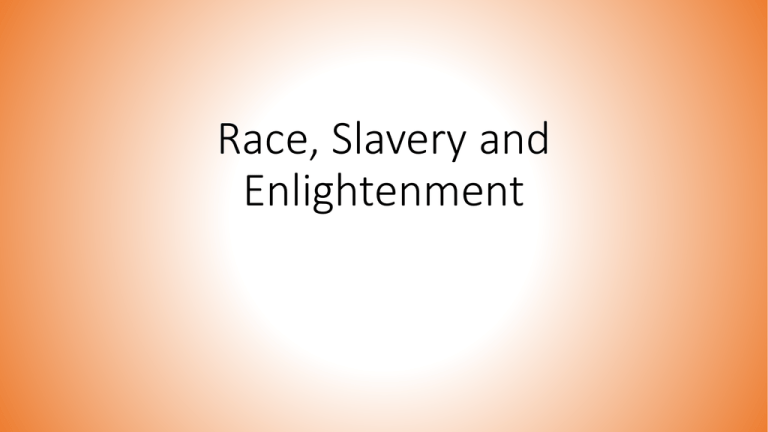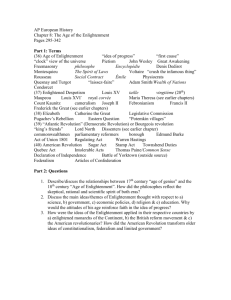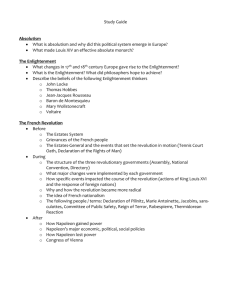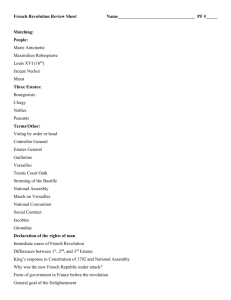Race, Slavery and Enlightenment
advertisement

Race, Slavery and Enlightenment French philosopher Tzevan Todorov (1939-) If one makes the effort to get beyond historical contingencies and reconstruct an ‘ideal type’ of the Enlightenment, its ideology can be described, for a number of reasons, as universalist and egalitarian—as far removed as possible from racialism. . . . This opposition became very clear-cut in the course of the nineteenth century: those who defended and promoted racialism ... were the self-declared enemies of the Enlightenment, the French Revolution and the ensuing democratic model of government.’ The Enlightenment: the erasure of race or the invention of « modern race »? New conceptions of knowledge : empiricism, observations, experiments The science of nature, discovering natural laws Classifications, taxonomies Swedish Botanist and Zoologist Carl Linnaeus (1707-1778) A global context: the century of the slave trade Africans embarked on slave ships A global context • Part of European Enlightenment- circulation of ideas (Scottish Enlightenment, Aufklärung, Lumières) • Distinction between the metropolis and the colonies • European France: only around 10 000 people of color at the end of the eighteenth century • Colonies (French Caribbean, Louisiana and Quebec, Guyane, Coast of Senegal, Mascarene Islands: around 800 000) Race in old regime societies: « the purity of blood » • Greek heritage • Christian monogenesis but biblical differentiation: the curse on Cham • Limpieza de sangre, from Spain to Europe • The noble lineage and aristocratic blood: Henri de Boulainvilliers, Essays on French nobility, 1732 • In the colonies, the fear of miscegenation: differences between the first Black Code (1685) and the Code of Louisiana (1724) • The color prejudice: discriminatory laws against Free people of color in the West Indies Blacks in European France Chevalier de Saint-Georges (17451799) Fencer and Musician Mademoiselle de Clermont en Sultane by Jean-Marc Nadier, 1733 Travel literature and ethnography • Jean-Baptiste Labat, New Travels to the American Islands, 1722 • Pierre François de Charleroix, History of the Spanish Island or of Saint Domingue, 1730-1731 • Abbé Prévost, General History of Voyages, 1745-1747 One humankind? Voltaire (1694-1778): antislavery and polygenisis Candide or the optimism (1759) Buffon (1707-1788) and the climate theory: the Degeneration thesis A debate of the Enlightenment • Montesquieu’s antislavery and climate’s theory in The Spirit of the Laws, 1749 • David Hume and Racial hierarchy • Emmanuel Kant and the Polygenesis theory Anatomical explorations Pierre Barrère, Anatomical Observations, 1753 Claude-Nicolas Le Cat, Treaty on the Color of the Human Skin, 1765. The Black Albino Debate Petrus Camper and the measurement of skulls Johann-Friedrich Blumenbach(1752-1840) and the Caucasian Skull Slavery, Abolitionism and the American Revolution • The Quaker Movement: Anthony Benezet • African-Americans in the American Revolution • A slaveholding Republic • Abolitionists societies in Philadelphia, London and Paris: Thomas Clarkson and Granville Sharp in England. The attack on slavery Raynal, Diderot and the History of Two Indies Olympe de Gouge (1748-1793): the rights of women and the rights of Blacks • Anti-slavery play Zamore and Mirza or the Happy Shipwreck, 1784 • Declaration of the rights of Woman (1791) Revolutions and the radicalization of racial discourse Moreau de Saint Mery (1750-1819): A Creole Enlightenment The Haitian Revolution or the Enslaved Enlightenment (1791-1804)? Toussaint Louverture and the rights of man.





